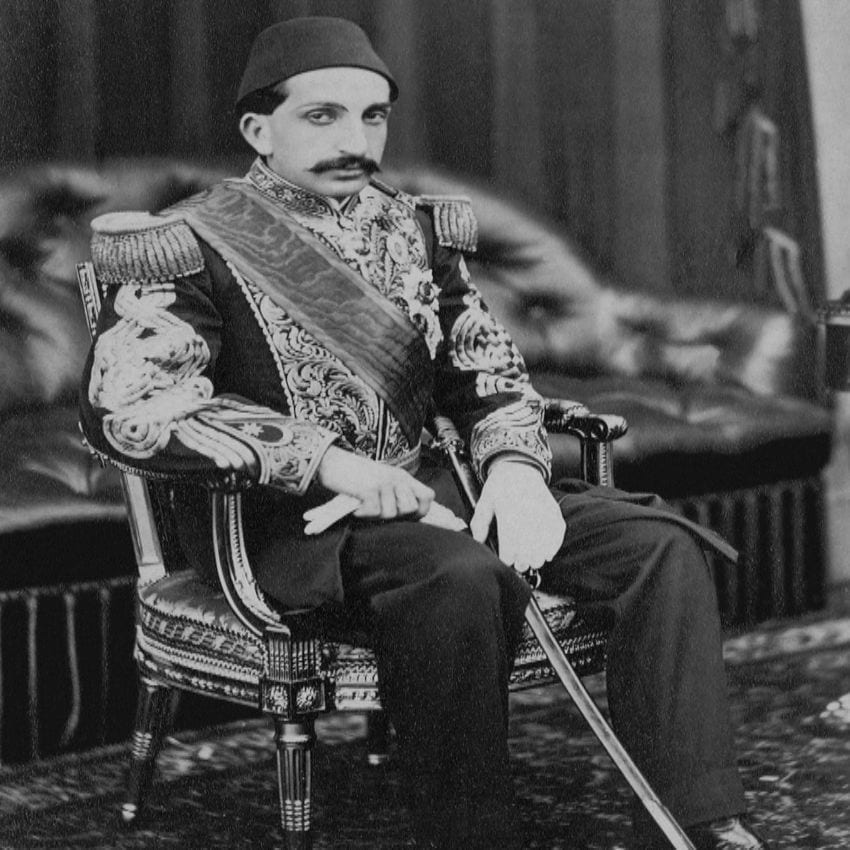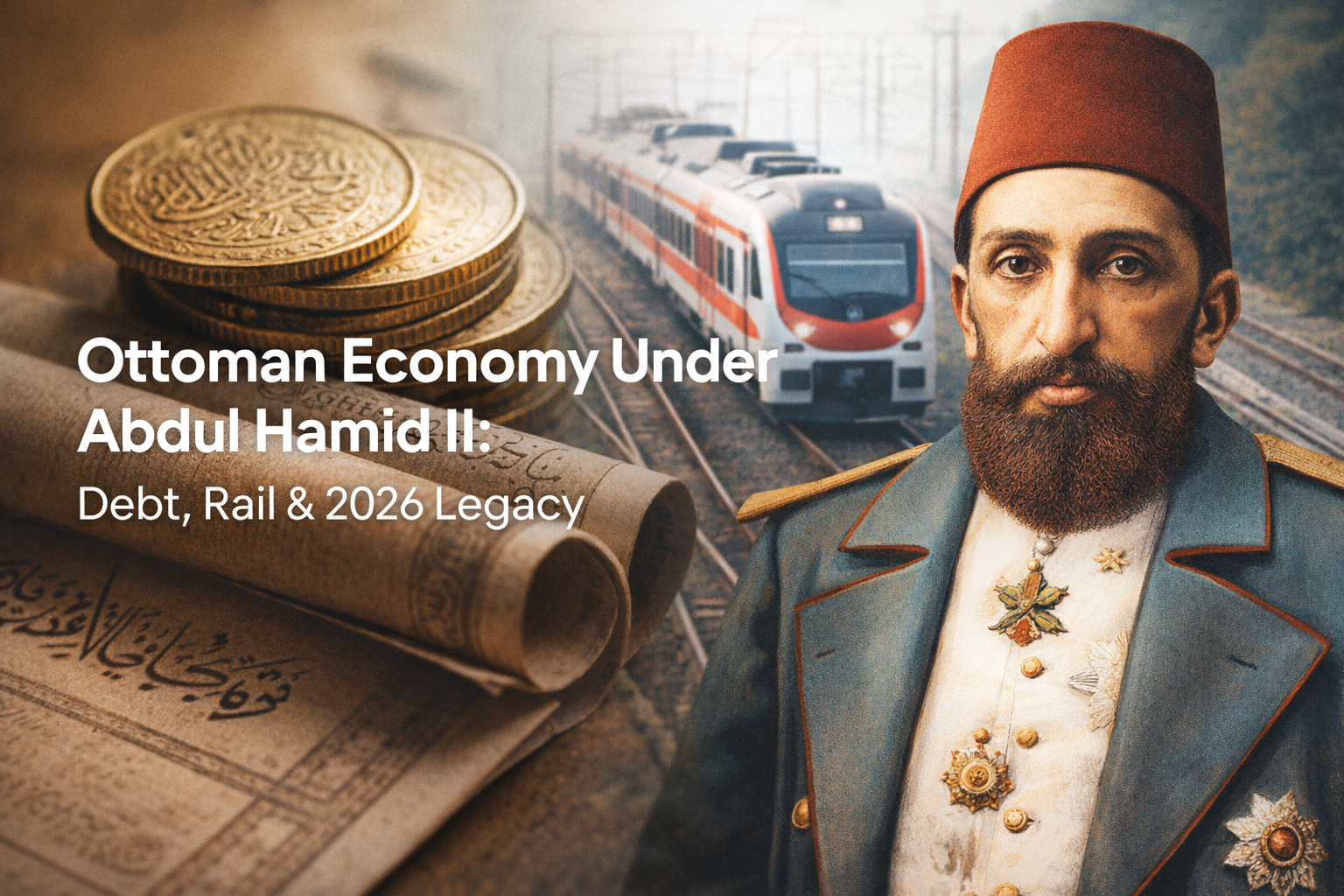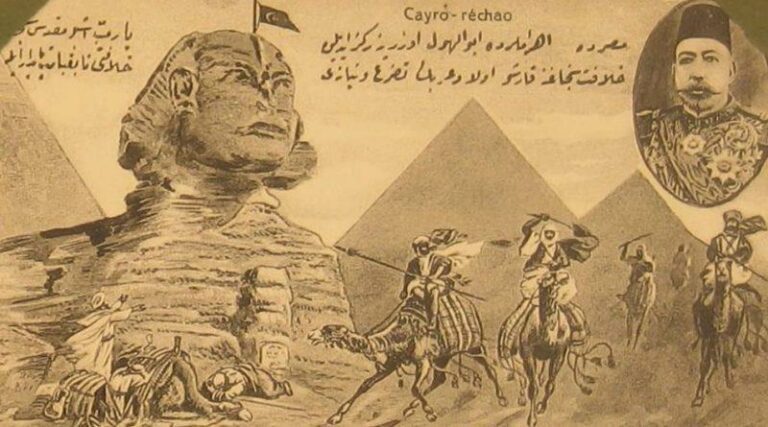Ottoman Economy Under Abdul Hamid II: Debt, Rail Legacy
Table of Contents
By the time Abdul Hamid II took the throne, the Ottoman treasury was effectively bankrupt. Interest payments swallowed revenues, foreign creditors dictated terms, and default was no longer a threat—it had already happened.
This reign wasn’t defined by ceremonies or slogans. It was defined by ledgers, cash flow, and survival. For 33 years, the empire ran an extended stress test—one whose results still shape institutions operating in 2026.
Strip away the praise and the attacks, and what’s left is hard economics. How did an overstretched empire keep functioning while buried under sovereign debt that would cripple many modern states?

The Debt Myth vs. The Mathematical Reality
A popular claim says Abdul Hamid II slashed Ottoman debt from 300 million sterling to almost nothing. The conclusion is flattering, but the math doesn’t hold up. The real story is more restrained—and more impressive.
The verified picture looks like this:
- The Starting Point (1881): Total nominal external debt stood at roughly 252 million Ottoman liras.
- The Haircut: Through the Decree of Muharrem, this was reduced to about 106 million liras, with repayment terms restructured under international supervision.
- The Exit (1909): By the end of his reign, total debt had risen slightly again to around 119 million liras.
The empire didn’t escape debt. It made it manageable. Credit stabilized, defaults stopped, and long-term planning became possible again.
The Railway Revolution: More Than Just Transport
In the late 19th century, railways were economic multipliers. Under Abdul Hamid II, the Ottoman rail network grew from about 1,300 km to roughly 5,700–6,000 km.
The payoff wasn’t theoretical. In regions connected by rail, state revenues—especially from the aşar tax and customs—rose between 69% and 144%. Grain moved faster, markets widened, and tax collection finally worked.
The Truth About the Hejaz Railway
The Hejaz Railway is often described as a donation-funded miracle. Donations did matter, but they didn’t cover everything. A significant share of the roughly 4 million Ottoman lira cost came from state revenues and targeted levies.
Civil servants faced mandatory salary deductions. Stamp duties were increased. The goal was clear: avoid foreign loans and keep control. It was an early example of mobilizing domestic capital for strategic infrastructure.
That logic still holds. Logistics remains decisive for growth—just as railways once were, modern industrial hubs like Kocaeli anchor Turkey’s manufacturing and export networks today.
Ziraat Bank: A 19th Century Startup Surviving in 2026
Ziraat Bank is the clearest institutional legacy of Abdul Hamid II. Its mission was simple: stop farmers from being crushed by usurers and stabilize food production.
On August 15, 1888, the Sultan formalized the transformation of local benefit funds into Ziraat Bank. As of the latest consolidated disclosure available in early 2026, the bank—still owned by the Turkey Wealth Fund (TVF)—reports total assets of approximately 8.67 trillion TL. It remains the backbone of agricultural finance, exactly as intended.
Seeing how these foundations were laid makes modern indicators easier to read, including Turkey’s current turnover and production data.
Technology and Modernization: Submarines to Automobiles
Abdul Hamid II distrusted reckless spending, not technology. He pushed modernization—but insisted it sit within a controlled budget.
- The First Submarines: The Abdülhamid and Abdülmecid, built in the late 1880s, were funded through the Ministry of the Navy, not the Sultan’s personal treasury. Their construction required industrial capacity comparable to the iron casting and manufacturing sectors operating in Turkey today.
- The First Car: Automobiles began appearing in Istanbul in the mid-1900s. New rules, new roads, and public skepticism followed—much like the learning curve foreigners face when buying a car in Turkey today.
The Hamidiye Water Project
Clean water may have been Abdul Hamid II’s most practical achievement. The Hamidiye network, inaugurated on May 26, 1902, captured water from more than 60 springs near Kemerburgaz and distributed it through 133 public fountains.
The End of an Era
Deposed in 1909, Abdul Hamid II didn’t save the empire—but he bought it time. Through debt consolidation, controlled foreign investment, and infrastructure guarantees like those used for the Baghdad Railway, he stretched Ottoman viability by decades.
As Turks check dates on the Turkey public holiday calendar, they pass banks, rail lines, and utilities shaped by that era’s hard economic choices—proof that fiscal policy can outlive empires.








